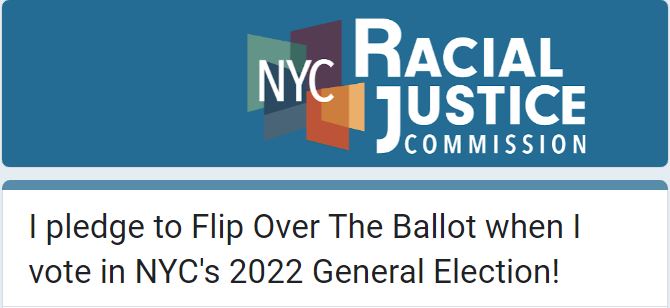
New York: New York City has established a Racial Justice Commission to eliminate racial discrimination (if any) and ensure the provision of equal rights to all.
Voters in the community eligible to cast votes will have to respond to three questions mentioned on the back of the ballot paper in next month’s New York City General elections so that the NYC charter could be amended in the larger interest of its dwellers. The amendment will remain effective for a period of two years.
The New York City government wants the diverse communities living in the City to be given equal importance in all government departments and sectors, and the law needs to be amended to implement the same.
The city government has recently set up a Commission for Racial Justice which will collate the opinions, suggestions, and recommendations of various communities and provide them to the government for amending the law.
The commission has asked each voter three questions on the back of the ballot paper in the election to be held on November 8.
The 1st Ballot Question will be: Add a Statement of Values to Guide Government. This proposal would amend the New York City Charter: Add a preamble, which would be an introductory statement of values and vision aspiring toward “a just and equitable city for all” New Yorkers; and Include in the preamble a statement that the City must strive to remedy “past and continuing harms and to reconstruct, revise, and reimagine our foundations, structures, institutions, and laws to promote justice and equity for all New Yorkers.”The preamble is intended to guide City government in fulfilling its duties. Shall this proposal be adopted?
The question No-2 will be about the establishment of a Racial Equity Office, Plan, and Commission. This proposal would amend the City Charter to: Require citywide and agency-specific Racial Equity Plans every two years. The plans would include intended strategies and goals to improve racial equity and to reduce or eliminate racial disparities; Establish an Office of Racial Equity and appoint a Chief Equity Officer to advance racial equity and coordinate the City’s racial equity planning process. The Office would support City agencies in improving access to City services and programs for those people and communities who have been negatively affected by previous policies or actions, and collect and report data related to equity; and Establish a Commission on Racial Equity, appointed by City elected officials. In making appointments to this Commission, elected officials would be required to consider appointees who are representative of or have experience advocating for a diverse range of communities. The Commission would identify and propose priorities to inform the racial equity planning process and review agency and citywide Racial Equity Plans. Shall this proposal be adopted?
The question No-3 will be about Measuring the True Cost of Living.This proposal would amend the City Charter to: Require the City to create a “true cost of living” measure to track the actual cost in New York City of meeting essential needs, including housing, food, childcare, transportation, and other necessary costs, and without considering public, private, or informal assistance, in order to inform programmatic and policy decisions; and Require the City government to report annually on the “true cost of living” measure. Shall this proposal be adopted?
Meanwhile the Apna community center is organizing various sessions to guide the Pakistani community living in New York in this regard, where registered voters from the community are being told how to answer the questions asked on the back of the ballot paper on polling day.
If Pakistani American voters want to take any help, they can visit the link provided by Apna Community Center and assure the city government that they, as Pakistani American voters, will give better suggestions to amend the law on polling day.








